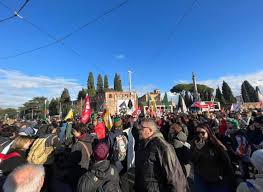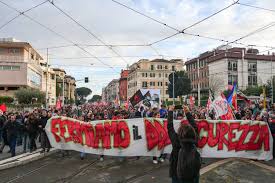Italy: Mass protests against Meloni’s security bill

Rome: Thousands of demonstrators flooded the streets of Rome to protest against the controversial security bill proposed by Giorgia Meloni’s government.
Organizers estimated the turnout at 100,000, with participants including trade unions, opposition parties, and numerous environmental and humanitarian groups. Critics have labeled the legislation “fascist” due to its perceived attack on political and social dissent.
The proposed law introduces harsh penalties for peaceful protests, such as blocking roads with sit-ins, a tactic often used by activists opposing projects like the Lyon-Turin high-speed railway.
The bill also targets migrants by banning the sale of SIM cards to individuals without residency permits. If passed, several provisions could result in prison sentences for what are currently non-criminal activities.

At the forefront of the march, protesters carried a large banner featuring a photomontage of Prime Minister Meloni embracing Benito Mussolini, setting the tone for the demonstration. “This bill criminalizes even the most peaceful forms of protest. It’s a dangerous authoritarian drift,” said Franca, a retired teacher.
Another protester, a Roman writer who preferred to remain anonymous, condemned the government: “This is a modernized form of fascism. Meloni’s administration is systematically eroding our rights and democracy.”
One of the most contentious measures is the ban on selling SIM cards to undocumented migrants. “This is a violation of human rights and contradicts our antifascist Constitution,” argued Gaia, a precariously employed teacher. Protesters and organizers alike described the bill as “an unprecedented attack on fundamental rights and democracy.”
The legislation, approved by the Chamber of Deputies in September, is now under review in Senate committees and could be passed by the end of the year. The “No DDL Sicurezza” network, which spearheaded the protests, released a statement calling the bill an effort to “criminalize dissent, suppress social conflicts, and target workers, students, migrants, and justice advocates.”
Former Prime Minister Giuseppe Conte also joined the protests. While criticizing the government’s “distorted understanding of security,” he faced heckling from a group accusing him of past alliances with far-right parties.





